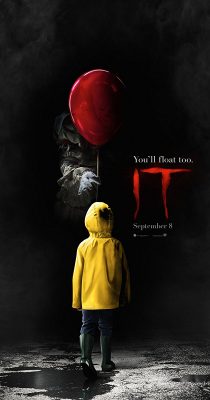Movie Studios Find Marvels In Stephen King
One of King’s most popular novels “IT” recently received a cinematic reboot in September. (COURTESY OF IMDB)
October 2, 2017
Movie studios have always been enamored with the immense library of Stephen King, but there has been an unusual resurgence of interest in his works over the past few years. While the shift started sometime in 2010, when “Haven”—a television series based loosely on King’s 2005 novel “The Colorado Kid”—began airing on the SyFy network, the trend did not really begin to gain traction until 2013, when “Under the Dome” and the remake of “Carrie” were both released.
This year marks the tipping point of this resurgence, as no less than eight of his properties will receive adaptations, including heavy hitters like “IT” (2017) and “The Dark Tower” (2017). Why exactly has there been such an oddly-timed increase in Stephen King adaptations? Why are people only now attempting large scale adaptations of his more nebulous works, outside of dramas like “The Shawshank Redemption” (1994) and “The Green Mile” (1999)? What factors in the television and film industries inspired networks, streaming sites and movie studios to begin creating works based on King’s vast bibliography? To answer these questions, one needs to take a journey into recent film history.
In the late 2000s, the fledgling Marvel Studios released its first self-produced film, “Iron Man” (2008), after years of sponsoring Sony’s “Spider-Man” and Fox’s “X-Men” movies. While seemingly innocuous at the time and largely eclipsed by the Academy Award-winning “The Dark Knight” (2008), “Iron Man” still netted an impressive box office return and universally positive critical praise. Marvel Studios quickly followed it up with a sequel, an Edward Norton-headed “Hulk” film (2008), “Thor” (2011), and “Captain America” (2011)—all of which released to good reviews, building up a sense of security in Marvel’s performance despite how unproven these properties were at the time.
However, Marvel’s riskiest venture yet was the release of “The Avengers” (2012), a movie that combined the heroes of those previous films. No one could have predicted that it would be as successful as it was. Smashing box office records and quickly ingraining itself into pop cultural memory, it was clear that “The Avengers” had changed the landscape of blockbuster cinema—and everyone would spend the subsequent years playing catch-up with Marvel Studios. Suddenly, the idea of a “cinematic universe” was in vogue and movie execs quickly got to copying Marvel’s formula. This included everyone from Marvel’s longtime rival DC, Universal Studios with their Dark Universe fronted by “The Mummy” (2017), Legendary Pictures’ “Godzilla” (2014) and “Kong: Skull Island” (2017) crossovers, and a number of others. How, then, does this all relate to Stephen King?
For King diehards, the answer is obvious: Stephen King has been creating shared universes since before Hollywood brought it to the forefront of popular entertainment. Nearly every book in King’s library is connected to each other in one way or another, with characters and events reverberating to and from each story. Locations especially recur, as fictional towns like Derry, originally from “IT” (1986), and Castle Rock, from “The Dead Zone” (1986), serve as settings with regularity. However, if all that brought King’s stories together were just references and nods, there would not be as much of a push to develop his properties now. Indeed, for a long time, Stephen King’s name was left off adaptations of his works and the stories themselves were valued more than King himself. This is why one identifies “The Shining” (1980) as a Stanley Kubrick film first before identifying it as one of King’s works, and the same goes for “Carrie” (1976) with Brian de Palma and “Stand By Me” (1986) with Rob Reiner. In addition, the kinds of stories that people tended to adapt were more serious dramas, “The Shawshank Redemption” chief among them, and King’s trademark horror novels were often left in the dust or stuck in developmental limbo, with “The Dark Tower” famously decried as “unfilmable.”
However, with science fiction, fantasy and superheroes more popular than ever, film execs have been looking to all sources to develop new cinematic universes. Taken at face value, it is not difficult to see why King’s properties took an upswing of popularity: if one were to imagine them as films, they would likely be relatively low-budget affairs that conveniently have a built-in reason to connect with each other. Thus, King’s more esoteric works—which before had proven unpopular with filmmakers—suddenly became viable properties.
Time will tell if these films and television shows will succeed, but it’s become clear that there’s a veritable Marvel Cinematic Universe underneath all of those pages, and it has been hiding right under everyone’s noses.














